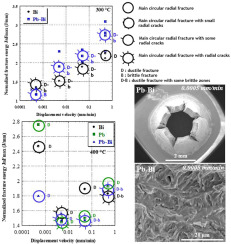Journal of Nuclear Materials ( IF 2.8 ) Pub Date : 2020-01-23 , DOI: 10.1016/j.jnucmat.2020.152021 Ingrid Proriol Serre , Jean-Bernard Vogt

|
The liquid metal embrittlement (LME) sensitivity of the martensitic T91 steel by Pb, Bi and LBE has been studied by small punch tests at different temperatures and strain rates. The LME occurrence in the three liquid metals depends on the strain rate and on the temperature. The T91 steel loaded in Bi, Pb or LBE presents ductile behaviour at 300 °C and at 400 °C except in LBE at 300 °C at very slow strain rate for which fully brittle fracture surface was observed. It appears that the LME sensitivity of the T91 steel by LBE and bismuth is more important at 300 °C than 400 °C. No LME by lead has been observed. The most embrittling liquid metal is LBE, then bismuth while the less one is lead. Some differences in the reactive wetting of the T91 steel by the saturated oxygen liquid metal could explain the difference in LME sensitivity in the three liquid metals.
中文翻译:

T91钢在铅,铋和铅铋共晶中的液态金属脆化敏感性
通过Pb,Bi和LBE对马氏体T91钢的液态金属脆化(LME)敏感性进行了小冲模试验,研究了其在不同温度和应变速率下的敏感性。三种液态金属中LME的出现取决于应变率和温度。负载在Bi,Pb或LBE中的T91钢在300°C和400°C时表现出延展性,但在300°C的LBE中,应变速率非常慢,观察到断裂面非常脆。看来,LBE和铋对T91钢的LME敏感性在300°C时比400°C更重要。没有发现铅的LME。最易碎的液态金属是LBE,然后是铋,而较少的是铅。











































 京公网安备 11010802027423号
京公网安备 11010802027423号